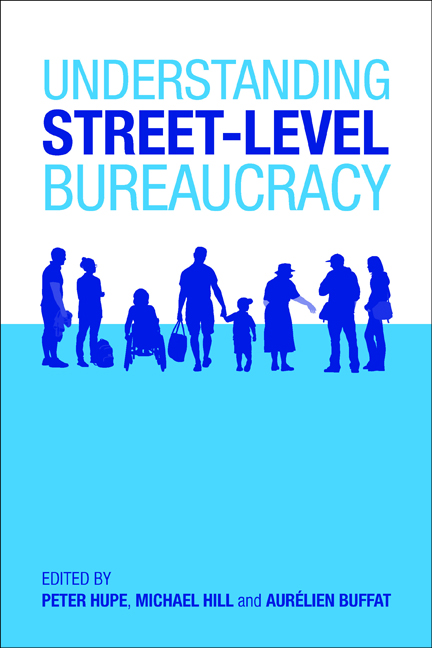Book contents
- Frontmatter
- Contents
- Biographical notes
- Preface
- Part One Introduction
- Part Two Delivering services and benefits: street-level bureaucracy and the welfare state
- Part Three Agents of the state: street-level bureaucracy and law enforcement
- Part Four Embedded in society: street-level bureaucrats as public actors
- Part Five The management of street-level bureaucrats
- Part Six The promise of professionalism
- Part Seven Conclusion
- References
- Index
Nine - Street-level bureaucrats and client interaction in a just world
Published online by Cambridge University Press: 08 March 2022
- Frontmatter
- Contents
- Biographical notes
- Preface
- Part One Introduction
- Part Two Delivering services and benefits: street-level bureaucracy and the welfare state
- Part Three Agents of the state: street-level bureaucracy and law enforcement
- Part Four Embedded in society: street-level bureaucrats as public actors
- Part Five The management of street-level bureaucrats
- Part Six The promise of professionalism
- Part Seven Conclusion
- References
- Index
Summary
Introduction
The bureaucrats working in public agencies are often the first, and sometimes the only, contact that the public has with the government. As this contact is most often with street-level bureaucrats who exercise discretion, understanding how the characteristics of street-level bureaucrats influence their behaviour is important in understanding policy implementation (Lipsky, 2010). There is a long literature examining bureaucratic representation that focuses on the identity of the street-level bureaucrat, primarily, race, ethnicity and gender. Instead, we theorise about how an individual street-level bureaucrat's values alter the use of discretion. This is an important question as discretion provides street-level bureaucrats with the opportunity to shape outputs and reward or disadvantage clients (Meier, 1993).
Researchers have long been concerned with understanding how street-level bureaucrats use discretion to provide public services. The concern stems from questions about the impact of discretion on democratic governance and the knowledge that as street-level bureaucrats exercise discretion, they may alter policy outcomes for clients. Bureaucrats on the front lines of service provision work in an environment governed by rules and procedures, and although their work is ‘rule-saturated’, it is not ‘rule-bound’ (Maynard-Moody and Musheno, 2003, p 10). In addition, monitoring bureaucratic behaviour is costly and often not possible. This environment results in street-level bureaucrats making decisions about which rules to apply, and, in doing so, they make choices that have an impact on the lives of their clients. Given this, it is important to develop theoretical models to identify the factors that affect the interactions between street-level bureaucrats and the clients of their agencies, particularly how the personal values of the bureaucrat influence her or his behaviour.
Work in the area of representative bureaucracy concerns how the identity of a bureaucrat affects the distribution of outputs to clients when the bureaucrat and client share demographic characteristics. The extant research on representative bureaucracy almost exclusively focuses on three identities – race, ethnicity and gender (notable exceptions are Thielemann and Stewart, 1996; Van Gool, 2008; Pitts and Lewis, 2009). However, recent work has expanded to consider a broader range of identities, including mutable identities (ie veteran status, profession and language). Implicit in much of the representative bureaucracy literature is the conflation of identity and other personal characteristics, including values. This research assumes that women and African-Americans hold certain values as part of their gender or racial identity.
- Type
- Chapter
- Information
- Understanding Street-Level Bureaucracy , pp. 155 - 168Publisher: Bristol University PressPrint publication year: 2015



